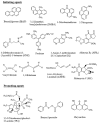DNA Damage, Mutagenesis and Cancer
- PMID: 29570697
- PMCID: PMC5979367
- DOI: 10.3390/ijms19040970
DNA Damage, Mutagenesis and Cancer
Abstract
A large number of chemicals and several physical agents, such as UV light and γ-radiation, have been associated with the etiology of human cancer. Generation of DNA damage (also known as DNA adducts or lesions) induced by these agents is an important first step in the process of carcinogenesis. Evolutionary processes gave rise to DNA repair tools that are efficient in repairing damaged DNA; yet replication of damaged DNA may take place prior to repair, particularly when they are induced at a high frequency. Damaged DNA replication may lead to gene mutations, which in turn may give rise to altered proteins. Mutations in an oncogene, a tumor-suppressor gene, or a gene that controls the cell cycle can generate a clonal cell population with a distinct advantage in proliferation. Many such events, broadly divided into the stages of initiation, promotion, and progression, which may occur over a long period of time and transpire in the context of chronic exposure to carcinogens, can lead to the induction of human cancer. This is exemplified in the long-term use of tobacco being responsible for an increased risk of lung cancer. This mini-review attempts to summarize this wide area that centers on DNA damage as it relates to the development of human cancer.
Keywords: DNA adduct; carcinogen; carcinogenesis; chronic exposure; metabolism; mutagen; somatic mutation; tumor.
Conflict of interest statement
The author declares no conflict of interest.
Figures





References
-
- Tsutsui H. Uber das kustlich erzeugte cancroid bei der maus. Gann. 1918;12:17–21.
-
- Cook J.W., Hieger I., Kennaway E.L., Mayneord W.V. The production of cancer by pure hydrocarbons. R. Soc. Proc. 1932;111:455–484. doi: 10.1098/rspb.1932.0068. - DOI
Publication types
MeSH terms
Substances
Grants and funding
LinkOut - more resources
Full Text Sources
Other Literature Sources

